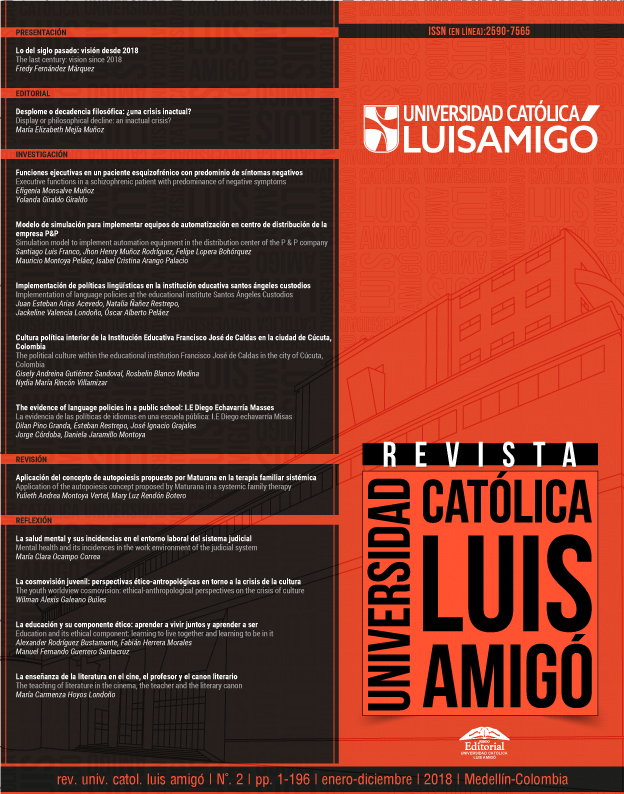The evidence of language policies in a public school: I.E Diego Echavarría Masses
DOI:
https://doi.org/10.21501/25907565.3046Keywords:
Bilingualism, Education system, Globalization, Language policy, National programs.Abstract
Due to the influences of globalization during the past tense, Colombia has implemented different language policies for the improvement of education. Social reality has been an obstacle for stakeholders at the time to cope with English. Different programs have been formulated by the National Government in Colombia. Some of them are PNB 2004-2018 (National Bilingualism Plan), The National law of Bilingualism in 2013 (Bilingualism Law), PNI 2015-2025 (National English Program), and most recently Colombia Bilingüe 2014-2018. They all tried to offer different strategies in order to improve the English level in Colombia; However, many studies have criticized those programs because they have not yielded the expected results. Despite criticisms, the last ICFES results published in 2015-2016 have shown that certain institutions have achieved favorable results in English. As a result, this study wants to explore how I.E. Diego Echavarría Misas is implementing language policies to obtain good results in the English national test. To carry this out, data collection techniques will be applied to different participants who work in the institution.Downloads
References
Ayala, J., & Álvarez, J. A. (2005). A perspective of the implications of the Common European Framework implementation in the Colombian socio-cultural context. Colombian Journal of Applied Linguistics 7, 7-26.
Bray, M., & Thomas, R. M. (1995). Levels of comparison in educational studies: Different insights from different literatures and the value of multilevel analyses. Harvard Educational Review, 65(3), 472-491. http://doi.org/10.17763/ haer.65.3.g3228437224v4877.
Correa D., Usma, J., & Montoya, J.C. (2014). El Programa Nacional de Bilingüismo: Un Estudio Exploratorio en el Departamento de Antioquia, Colombia. Íkala, Revista de Lenguaje y Cultura, 19 (1), 101-116.
Congreso de la República (2013). Ley 1651, por medio de la cual se modifican los artículos 13, 20, 21, 22, 30 y 38 de la Ley 115 de 1994 y se dictan otras disposiciones-Ley de bilingüismo. Ministerio de Educación Nacional. (1994). Retrieve from: http://wsp.presidencia.gov.co/Normativa/Leyes/Documents/2013/LEY%201651%20DEL%2012%20DE%20JULIO%20DE%202013.pdf
Genesse, F. (2007). Bilingual education and use: Entrevista con Fred Genesse. Revista Internacional Magisterio: Educación y Pedagogía, 25, 62-66.
Glesne, C. (2006). Becoming qualitative researchers: an introduction (3rd ed.). New York, NY: Pearson Education, Inc.
González, A. (2007). Professional development of EFL teachers in Colombia: Between colonial and local practices. Íkala, Revista de Lenguaje Y Cultura, 12 (18), 309–332.
Guerrero, C. H. (2008). Bilingual Colombia: What does it mean to be bilingual within the framework of the National Plan of Bilingualism? PROFILE Issues in Teachers’ Professional Development, 10 (1), 27–45.
Levinson, B. A. U., Sutton, M., & Winstead, T. (2009). Education policy as a practice of power: Theoretical tools, ethnographic methods, democratic options. Educational Policy, 23(6), 767-795. DOI: http://doi. org/10.1177/0895904808320676.
Levinson, B. A. U., & Sutton, M. (2001). Introduction: Policy as/in practice: A sociocultural approach to the study of educational policy. In M. Sutton & B. A. U. Levinson (Eds.), Policy as practice: Toward a comparative sociocultural analysis of educational policy (pp. 1-22). Westport, us: Ablex Publishing.
Ministerio de educación Nacional (2004). Programa nacional de bilingüismo: Estándares Básicos de Competencias en Lengua Extranjera: inglés. Retrieve from http://www.colombiaaprende.edu.co/html/mediateca/1607/articles-115375_archivo.pdf
Ministerio de educación Nacional (2012). Proyecto de Fortalecimiento al Desarrollo de Competencias en Lenguas Extranjeras. Retrieve from http://www.colombiaaprende.edu.co/html/micrositios/1752/articles-315518_recurso_5.pdf
Ministerio de educación Nacional (2014). Programa Colombia Bilingüe 2014-2018. Retrieve from https://goo.gl/80MXbR
Ministerio de educación Nacional (2014). Programa Nacional de Inglés 2015-2025. Retrieve from http://www.colombiaaprende.edu.co/html/micrositios/1752/articles-343287_recurso_1.pdf
Peláez O. & Usma J. (2017). The Crucial Role of Educational Stakeholders in the Appropriation of Foreign Language Policies: A Case Study.
Roldan A. & Peláez, O. (2017). Pertinencia de las políticas de enseñanza del inglés en zonas rurales colombianas: un estudio de caso en Antioquia. Íkala. Revista de Lenguaje y Cultura, 22 (1), DOI:
Ricento, T. K., & Hornberger, N. H. (1996). Unpeeling the onion: Language planning and policy and the elt professional. tesol Quarterly, 30(3), 401-427. DOI: http:// doi.org/10.2307/3587691.
Steiner-Khamsi, G. (Ed.). (2004). The global politics of educational borrowing and lending. New York, us: Teachers College Press.
Spolsky, B. (2004). Language Policy. New York: Cambridge University Press.
Usma, J. (2009). Education and Language Policy in Colombia: Exploring Processes of Inclusion, Exclusion, and Stratification in Times of Global Reform. PROFILE Issues in Teachers’ Professional Development, 11 (1), 123-141. Retrieved from http://revistas.unal.edu.co/index.php/profile/article/view/10551/36787
Usma, J. (2015). From transnational language policy transfer to local appropriation: The case of the National Bilingual Program in Medellín, Colombia. Blue Mounds, WI: Deep University Press. 1
Downloads
Published
How to Cite
Issue
Section
License
PROPIEDAD INTELECTUAL
Los autores son moral y legalmente responsables del contenido de sus artículos, así como del respeto a los derechos de autor. Por lo tanto, éstos no comprometen en ningún sentido a la Universidad Católica Luis Amigó.
La reproducción de los artículos se regirá conforme a lo descrito en http://creativecommons.org/licenses/by-nc-sa/4.0/

